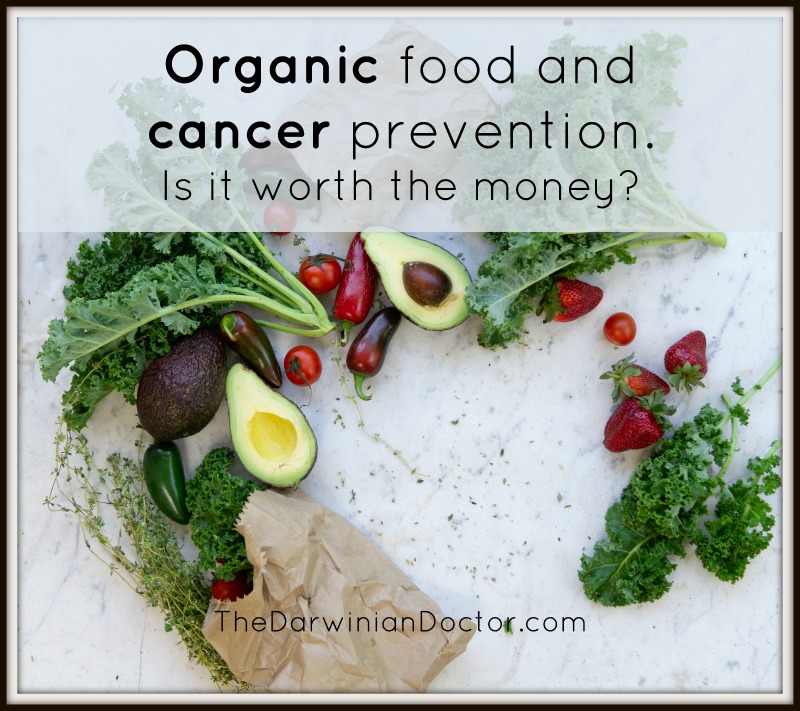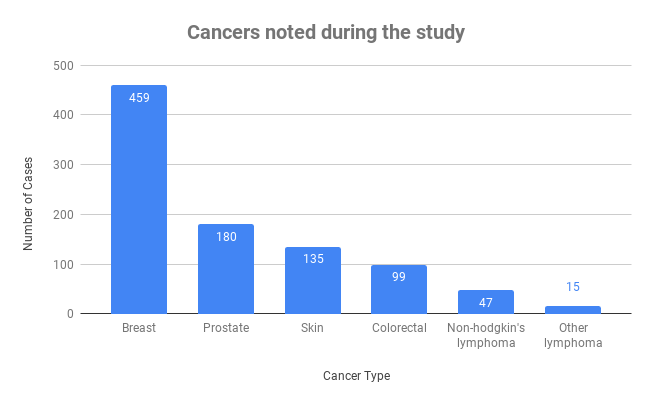Does organic food reduce your risk of cancer? We look at the results from the NutriNet-Sante study. Is the evidence good enough to convince us?

As part of my mission towards constant evolution into my best self, I like to occasionally make lifestyle changes to improve my health and well-being. Being a physician, I like to base these changes on cold hard evidence, namely research studies.
Every once in a while, I’ll pick a topic and put it under the microscope to see if there’s enough evidence to prompt a change in my lifestyle. I did this for coffee, and I now drink at least a few cups of coffee every day, guilt free.
In this post, I’ve tried to do the same thing with the topic of organic foods.
Introduction
As anyone striving for financial independence knows, money spent on food is usually a major component of your budget. When the Dr-ess and I broke down our monthly expenditures, we found that we were spending over $1000 a month on food for a family of four.
This number used to be more like $600 a month, but shot up like a rocket last year when we decided to start purchasing organic produce and meats. Around where I live, that means shopping at Whole Foods.
Whole Foods? More like Whole Paycheck.

Even though Whole Foods was purchased by Amazon in mid 2017, it still hasn’t shaken its nickname, “Whole Paycheck.” Indeed, a Gordon Haskett researcher found that the change of owner really didn’t change prices very much at all.
Chicken thighs
Last week, I had a striking reminder of the cost of organic versus non-organic foods. In a recent trend towards eating less carbohydrates, I bought and consumed about four pounds of (non-organic) chicken thighs in a week. Total cost for the chicken thighs at the local regular grocery store was $8.
This week, our nanny did the grocery shopping at Whole Foods and picked up four pounds of organic chicken thighs. Total cost was $28. Yeah. Over three times as expensive!
Organic food and cancer risk

So why did we decide to start getting our fruits, vegetables, and meats from such an expensive place? It was a snap decision from a NY Times article from late 2018. This article covered a study from France, which showed that the most frequent consumers of organic food seemed to lower their risk of cancer by about 25%. Because of this study, we made an immediate shift to eat more organic foods. I didn’t look into the details of the study much at that time, but I think it’s about time. This organic food habit is really making a dent in our wallets!
What does organic really mean?
It’s helpful to define the term “organic.” Broadly, “organic” food means it hasn’t been produced using artificial chemicals. For produce, that means no artificial fertilizers or pesticides. For meat and dairy products, this means the animals are given organic feed to eat, and are not given antibiotics or growth hormones. The exact rules and regulations by which farmers need to abide are defined by the United States Department of Agriculture, and are incredibly specific.
The NutriNet-Sante study
So let’s look at the actual study that got all the press in 2018: “Association of frequency of organic food consumption with cancer risk.” This is also known as the NutriNet-Sante study.
Want the TLDR version? Click here to go to my conclusions.
Who wrote the study?
The primary author, Julia Baudry, PhD, is affiliated with INSERM, aka the National Institute of Health and Medical Research in France. This is a “French public body dedicated to biological, medical and population health research.”
This is good. The general assumption is that public research organizations will be more impartial than private organizations.
Are there conflicts of interest?
Even though the main research organization was a public entity, this might not mean anything if the primary authors are also on the payroll of some corporation that stands to gain market share or some other benefit based on the results of the research.
In this case, there were no conflicts of interests. As far as I (or the journal) could tell, there were no shadowy organizations pulling the strings behind the scenes of the study. This is also good.
Who paid for the study?


Even if there are no conflicts of interest, sometimes private organizations will simply just “donate” money for scientific research. This is a double edged sword, as despite the best intentions of the researchers, this undeniably has the potential to consciously or unconsciously influence the study in many ways to the benefit of the private organization.
For example, if the oil industry funds a study on the effect of fossil fuel on global warming, it’s probably a reason to look a bit more critically about the study conclusions. Similarly, if a study on organic foods and cancer risk is found to be funded by Whole Foods (aka Amazon), those conclusions might be a bit suspect as well.
When we follow the money on the French study, we find that the study was funded entirely by public and government funds. This is good, and lends legitimacy to their findings.
Where was the study published?
The article was published in JAMA Internal Medicine, which is the Internal Medicine branch of the Journal of the American Medical Association. It’s a highly respected journal, with an impact factor that places it fifth out of 154 similar journals. The research standards of the more respected journals are higher than the less respected journals. They require more rigorous study criteria than less respected journals. This is good too!
Methods
This was a “prospective cohort study,” which means that they created a group of almost 70,000 people and followed them from 2009 to 2016. It was web and volunteer based, and the group ended up being 78% female, with the average age being about 44 years old.
This is a nice large group of people, but one huge limitation was that the authors relied on self-report to track the organic food consumption. Self report is notoriously unreliable. But if you want to keep track of a large population, it’s probably the only way to do it, unless there are unlimited funds available for monitoring (and there never are). Some self reported information can be okay if it is done using a “validated” survey, but the method in the Nutrinet-Sante study was not validated.
At the end of the study, they basically looked at all the people who got cancer during this time period (there were 1340 of them), and figured out how much organic food consumption they reported relative to the rest of the population.
Results
Their findings could be summarized into two key points:
- The people who ate the most organic food had a 25% lower relative risk of developing cancer
- This was found to apply specifically to breast cancer and non-Hodgkin’s lymphoma risk


Discussion
When you delve into the study data they found that their study group tended to be wealthier and healthier at baseline than most people. They tried to control for these and other variables, but it’s always hard to generalize findings that are based on a fundamentally different patient population.
The study length (7 years) was also fairly short and the average age (44 years) relatively young for a cancer study. A lot of cancers take a long time to develop and become clinically significant. The average age of diagnosis for breast cancer, for example, is 62.
The findings of this study were somewhat in line with the much larger Million Women Study in the United Kingdom, which in 2014 reported an association between organic food intake and a 21% lower risk of non-Hodgkin’s lymphoma. But interestingly, that study showed didn’t replicate the breast cancer results, and even suggested that organic food increased breast cancer risk slightly.
Conclusion
So after a review of the NutriNet-Sante study, what can we conclude?
Despite all the limitations, I think it adds to the compelling body of literature that connects organic food intake to lower risk of cancer, especially lymphoma. This study reinforced the findings of a previous large study, and together support a 20-25% lower risk of at least non-Hodgkin’s lymphoma.
So what about Whole Foods?
As long as we can still meet our ambitious financial goals, I see no reason to stop our organic food habit for now. There’s growing evidence that it lowers risk of non-Hodgkin’s lymphoma and possibly other cancers.
Amazon recently stated that they’ll be slashing prices on hundred of more food items. Somehow I doubt that this will actually change our monthly grocery bill, but I will certainly give an update if it does. I’d love to be proven wrong on this
So what do you think? Are you going to try to eat more organic food too? Comment below!
Related Posts:
- 5 great reasons to drink coffee every day!
- The Epidemic of Physician Burnout
- 5 Exercises to Do on Your Morning Commute
Want to support the blog?
- Join our investor club at Cereus Real Estate
- Visit my Recommendations page
- Check out my wife’s food blog: Eat Dessert First
- Stay at our luxury short term rentals
- Check out my TikTok channel
- Follow me on Instagram
- Follow me on YouTube
- Contact me with questions


4 comments
My family eats organic whenever we can. Especially the “dirty dozen” produce that has the most pesticide load and grains such as oatmeal, corn, and soy.
We don’t eat meat or dairy, favoring a whole foods, plant based blue zone inspired diet because in my opinion, and based on multiple studies, it is the most optimal for health, vitality, performance, and longevity.
Hi Dr. McFrugal,
As long as we can afford it, I feel we will make organic food a priority as well.
The plant based diet is certainly a winner based on the studies. The Dr-ess and I have tried it with limited success (mainly dairy cravings), but come back to it every now and then.
Thanks for stopping by!
— TDD
I appreciate the importance of evidence-based lifestyle changes. The NutriNet-Sante study is well-conducted research and the fact that the primary author and research organization are impartial is reassuring. I also understand the struggle of balancing the budget with organic food choices, but the potential health benefits make it worth considering. Thank you for delving into the topic and presenting the information in a clear and concise manner.
Thanks for reading!